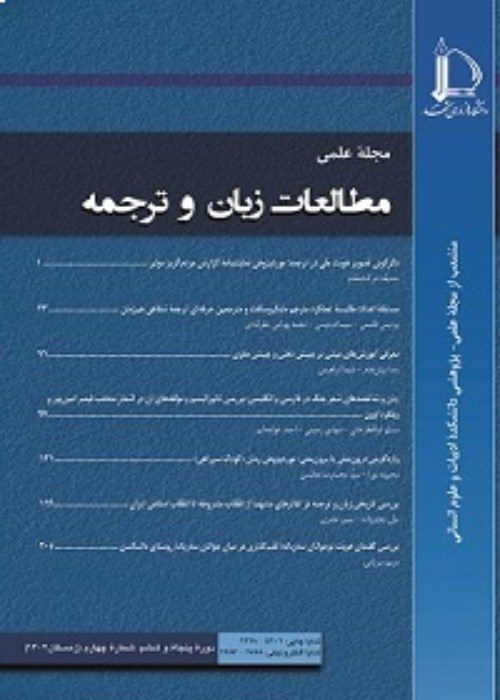Analyzing the Repetition of the Phrase “بسم الله الرحمن الرحیم” in the Holy Quran and Assessing its French Translations
One of the ways through which the holy Quran attempts to convey various messages is repetition; this may hold true for a single word, a phrase, or a sentence. The holy Quran was revealed to the Prophet gradually during 23 years. Consequently, it was necessary for a number of phrases and anecdotes to be repeated in order to guide and nurture people. This demonstrates the fact that Quran is not merely a history book in which an event is described only once and then neglected for the rest of the book, but it is a book of education and humanization; as it is perfectly known that certain events ought to be repeated again and again, given the educational conditions, by looking at subjects through various dimensions and reaching conclusions in every direction. In other words, education sometimes requires reliance on an important matter for a number of times in order to induce a profound impact on the readers’ minds and orient the minds towards more subjects.
Of the highly repeated phrases in Quran, “بسم الله الرحمن الرحیم” has been mentioned over 114 times. It has been repeated 113 times at the beginning of 113 surahs, and once in “Naml” surah at the beginning of Solomon’s letter to Belcais. Given the similar appearance of this phrase throughout Quran, one may consider a same meaning and interpretation for the phrase; however, it can also be interpreted according to where it is used in Quran as well as its subsequent verses.
Following the analysis of the phrase in Quran in this study, 10 accessible translations of the phrase were examined using the descriptive-analytical method with reference to valid interpretations in order to identify the suitable translation. Ultimately, several recommendations were provided for the correct translation of the phrase.
In fact, “بسم الله الرحمن الرحیم” is a part of each surah and is in compliance with its contents. As each surah includes a theme different with others, “بسم الله الرحمن الرحیم” then conveys a different meaning in each of the surahs. Undoubtedly, the purpose of each surah is different from the others, and the purpose remains the same to the end of that surah. As a result, this phrase in each surah denotes the very single intention that is followed in such a surah. Taking into account the significance of the phrase as well as the fact that it contains the Almighty’s name, we should translate the Quran through proper means so as to convey its true meaning to the reader. In this study, 10 French translations of this phrase were analyzed. It was revealed that the translators had only transferred the formal meaning of the words and failed to transfer their true meanings. Consequently, it is essential to examine the meaning of the words in this phrase in order to provide a proper platform for a profound understanding of its true meaning, so that a suitable equivalent could be found in French.
Based on the results of the current study, the researchers have proposed the following recommendations for translating this phrase:Though the phrase consists of only four words, its translation to another language is considerably difficult; in this regard, none of the ten selected translators had been able to offer a correct translation and failed to correctly convey its meaning. These translators could have referred to interpretation books so as to decode such Quranic words and then attempted to transfer their meanings to French. This could have resulted in fewer mistakes in transferring Quranic notions, at least by specifying the semantic difference between the two adjectives, “raḥmān” and “raḥīm”. A sole fluency over Arabic and French is not a sufficient qualification for translation as the translators have to fully comprehend Quranic words and phrases prior to any attempt for translation; doing so requires translators’ complete familiarity with the Quranic language along with using Hadith and narratives in cases where the words are vague or ambiguous. In these ten translations of the phrase, “بسم الله الرحمن الرحیم”, it was observed that the translators had only paid attention to the formal meaning of the words, selecting equivalents that failed to transfer the true meaning of the verse. Subsequently, it would have been better if they had considered such words through a more scrupulous perspective, searching for their hidden meanings as well. Nonetheless, this requires a collective attempt for translation. A more suitable and uniform translation of the phrase could have been provided if there were unvarying, proper dictionaries in the area of translating Islamic texts, specially the holly Quran. The absence of such books has led to the emergence of various translations of a single phrase, as the majority of translators act according to their ideological orientations. Such ideological perspectives of translators could easily be identified through a closer look at their chosen equivalents. For instance, Chouraqui had attempted to use equivalent terms with Hebrew origins in order to translate the words of the phrase. As the Hebrew language belongs to the Jewish community, it can be inferred that he was unable to disregard his ideologies which had affected his selection of words.
- حق عضویت دریافتی صرف حمایت از نشریات عضو و نگهداری، تکمیل و توسعه مگیران میشود.
- پرداخت حق اشتراک و دانلود مقالات اجازه بازنشر آن در سایر رسانههای چاپی و دیجیتال را به کاربر نمیدهد.


